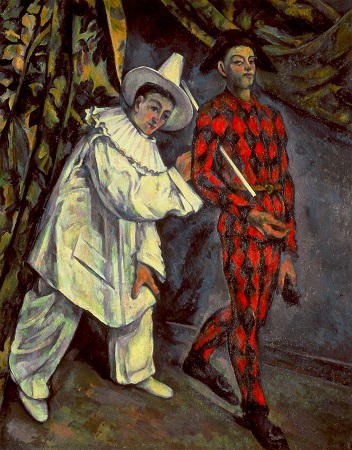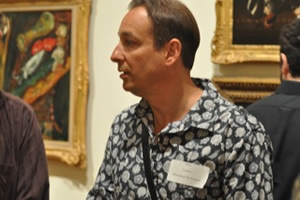Bij Carnaval

Carnaval door Paul Cézanne, 1888.
Missing Carnival
O Venlo, Venlo, stedje van pleseer. This time
her body made him think of countryside,
some figure from his childhood, sun on scythe,
wind blowing shadows across the shining barley,
the milk-pail dented from use, the smell of leaf-mulch
and leather in the tack room. Soon she’d take bus
and ferry from London to Belfast, but first
the fire in her bed-sit. Her fingers traveled too,
down the raised purple scars along his vertebrae,
the flannel sheets between her thighs, his hair
trailing along her abdomen, the quill
of a feather poking through seams of the comforter,
the comforter itself. Those scars—he’d lied
to her, his time in Nicaragua, thugs cut
him coming from the fields. The bloodier fight
was with his brother, slicing tines of a pitchfork
plucked up along the flooded Maas. Everything
reduced to trinket and anecdote, the beer
and facepaint of carnival, street-dance and tuba,
beyond the muddy English roundabouts, the brown
and white waves, yellow lamps along Dutch highways,
his work at the union office pinned beneath
a glass globe paperweight—shaken
it showered silver snow over the wide
straw hat, red and green plow, the slouching body,
a campesino from days before Somoza fell.
He wondered if she were any better, smuggling
French social theory into Ulster, encounter
groups in the rec-centers of tower-block basements.
She’d just gotten the news: her last lover died
in a fire along the side of the highway, body
broken in seven places, silver chrome,
pearl and gold gas tank scorched, his bike crumpled
beneath the husk of an overturned van.
There wasn’t much to talk about. Afterwards she lay
with her back to him and he sang her carnival songs
in a language she didn’t speak, O Venlo, stedje van
pleseer. He thought of himself as the sun, kissing
her neck at the hairline, turning grey cobblestones
of the town-square silver, marshaling parades.

John Hennessy (Philadelphia, 1965)
Lees verder “Carnival (John Hennessy), Barbara Honigmann, Detlev Meyer, Lou Andreas-Salomé”
